Deck 4: Exponential and Logarithmic Functions
Question
Question
Question
Question
Question
Question
Question
Question
Question
Question
Question
Question
Question
Question
Question
Question
Question
Question
Question
Question
Question
Question
Question
Question
Question
Question
Question
Question
Question
Question
Question
Question
Question
Question
Question
Question
Question
Question
Question
Question
Question
Question
Question
Question
Question
Question
Question
Question
Question
Question
Question
Question
Question
Question
Question
Question
Question
Question
Question
Question
Question
Question
Question
Question
Question
Question
Question
Question
Question
Question
Question
Question
Question
Question
Question
Question
Question
Question
Question
Question

Unlock Deck
Sign up to unlock the cards in this deck!
Unlock Deck
Unlock Deck
1/314
Play
Full screen (f)
Deck 4: Exponential and Logarithmic Functions
1
Given the function f : = {(1, 2), (2, 3), (3, 4)} write the set of ordered pairs representing 

{(2, 1), (3, 2), (4, 3)}
2
Use the definition of a one-to-one function to determine if the function is one-to-one.

A) No
B) Yes

A) No
B) Yes
A
3
A function defined by  ) (is/is not) a one-to-one function if no horizontal line intersects the
) (is/is not) a one-to-one function if no horizontal line intersects the
graph of f in more than one point.
 ) (is/is not) a one-to-one function if no horizontal line intersects the
) (is/is not) a one-to-one function if no horizontal line intersects thegraph of f in more than one point.
is
4
The notation is often used to represent the inverse of a function f and not the reciprocal of
f.
f.

Unlock Deck
Unlock for access to all 314 flashcards in this deck.
Unlock Deck
k this deck
5
Determine if the relation defines y as a one-to-one function of x.
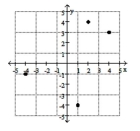
A) Yes
B) No

A) Yes
B) No

Unlock Deck
Unlock for access to all 314 flashcards in this deck.
Unlock Deck
k this deck
6
Determine if the relation defines y as a one-to-one function of x.
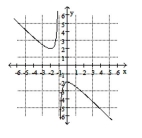
A) Yes
B) No

A) Yes
B) No

Unlock Deck
Unlock for access to all 314 flashcards in this deck.
Unlock Deck
k this deck
7
If no horizontal line intersects the graph of a function f in more than one point then f is a
- - function.
- - function.

Unlock Deck
Unlock for access to all 314 flashcards in this deck.
Unlock Deck
k this deck
8
Given a one-to-one function defined by 


Unlock Deck
Unlock for access to all 314 flashcards in this deck.
Unlock Deck
k this deck
9
Determine if the relation defines y as a one-to-one function of x.
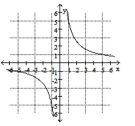
A) Yes
B) No

A) Yes
B) No

Unlock Deck
Unlock for access to all 314 flashcards in this deck.
Unlock Deck
k this deck
10
The function defined by  is/is not) a one-to-one function, whereas
is/is not) a one-to-one function, whereas  0 (is/is not) a one-to-one function.
0 (is/is not) a one-to-one function.
 is/is not) a one-to-one function, whereas
is/is not) a one-to-one function, whereas  0 (is/is not) a one-to-one function.
0 (is/is not) a one-to-one function.
Unlock Deck
Unlock for access to all 314 flashcards in this deck.
Unlock Deck
k this deck
11
Determine if the relation defines y as a one-to-one function of x.
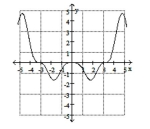
A) Yes
B) No

A) Yes
B) No

Unlock Deck
Unlock for access to all 314 flashcards in this deck.
Unlock Deck
k this deck
12
Choose the one alternative that best completes the statement or answers the question.
A relation in x and y is given. Determine if the relation defines y as a one-to-one function of x.

A) Yes
B) No
A relation in x and y is given. Determine if the relation defines y as a one-to-one function of x.

A) Yes
B) No

Unlock Deck
Unlock for access to all 314 flashcards in this deck.
Unlock Deck
k this deck
13
A function f is a - - function if for a and b in the domain of f, if 


Unlock Deck
Unlock for access to all 314 flashcards in this deck.
Unlock Deck
k this deck
14
Determine if the relation defines y as a one-to-one function of x.
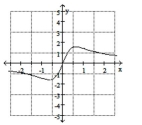
A) Yes
B) No

A) Yes
B) No

Unlock Deck
Unlock for access to all 314 flashcards in this deck.
Unlock Deck
k this deck
15
Choose the one alternative that best completes the statement or answers the question.
A relation in x and y is given. Determine if the relation defines y as a one-to-one function of x.
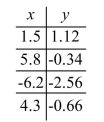
A) Yes
B) No
A relation in x and y is given. Determine if the relation defines y as a one-to-one function of x.

A) Yes
B) No

Unlock Deck
Unlock for access to all 314 flashcards in this deck.
Unlock Deck
k this deck
16
Let f be a one-to-one function and let g be the inverse of f. Then  and
and  .
.
 and
and  .
.
Unlock Deck
Unlock for access to all 314 flashcards in this deck.
Unlock Deck
k this deck
17
The function 


Unlock Deck
Unlock for access to all 314 flashcards in this deck.
Unlock Deck
k this deck
18
The graph of a function and its inverse are symmetric with respect to the line ______.

Unlock Deck
Unlock for access to all 314 flashcards in this deck.
Unlock Deck
k this deck
19
Choose the one alternative that best completes the statement or answers the question.
A relation in x and y is given. Determine if the relation defines y as a one-to-one function of x.

A) Yes
B) No
A relation in x and y is given. Determine if the relation defines y as a one-to-one function of x.

A) Yes
B) No

Unlock Deck
Unlock for access to all 314 flashcards in this deck.
Unlock Deck
k this deck
20
If (a, b) is a point on the graph of a one-to-one function f, then the corresponding ordered pair
is a point on the graph of
is a point on the graph of


Unlock Deck
Unlock for access to all 314 flashcards in this deck.
Unlock Deck
k this deck
21
A one-to-one function is given. Write an expression for the inverse function.



Unlock Deck
Unlock for access to all 314 flashcards in this deck.
Unlock Deck
k this deck
22
Solve the problem.



Unlock Deck
Unlock for access to all 314 flashcards in this deck.
Unlock Deck
k this deck
23
Solve the problem.
There were 2,300 applicants for enrollment to the freshman class at a small college in the year 2010. The number of applicants has risen linearly by roughly 170 per year. The number of applications f
(x) is given by f (x) = 2,300 + 170x, where x is the number of years since 2010.
A) Determine if the function is the inverse of f.
is the inverse of f.
B) Interpret the meaning of function g in the context of the problem.
A) a. Yes b. The value g(x) represents the number of years since the year 2010 based on the number of
Applicants to the freshman class, x.
B) a. No b. The value g(x) represents the number of applicants to the freshman class based on the number
Of years since 2010, x.
C) a. No b. The value g(x) represents the number of years since the year 2010 based on the number of
Applicants to the freshman class, x.
D) a. Yes b. The value g(x) represents the number of applicants to the freshman class based on the number
Of years since 2010, x.
There were 2,300 applicants for enrollment to the freshman class at a small college in the year 2010. The number of applicants has risen linearly by roughly 170 per year. The number of applications f
(x) is given by f (x) = 2,300 + 170x, where x is the number of years since 2010.
A) Determine if the function
 is the inverse of f.
is the inverse of f.B) Interpret the meaning of function g in the context of the problem.
A) a. Yes b. The value g(x) represents the number of years since the year 2010 based on the number of
Applicants to the freshman class, x.
B) a. No b. The value g(x) represents the number of applicants to the freshman class based on the number
Of years since 2010, x.
C) a. No b. The value g(x) represents the number of years since the year 2010 based on the number of
Applicants to the freshman class, x.
D) a. Yes b. The value g(x) represents the number of applicants to the freshman class based on the number
Of years since 2010, x.

Unlock Deck
Unlock for access to all 314 flashcards in this deck.
Unlock Deck
k this deck
24
The graph of a function is given. Graph the inverse function.
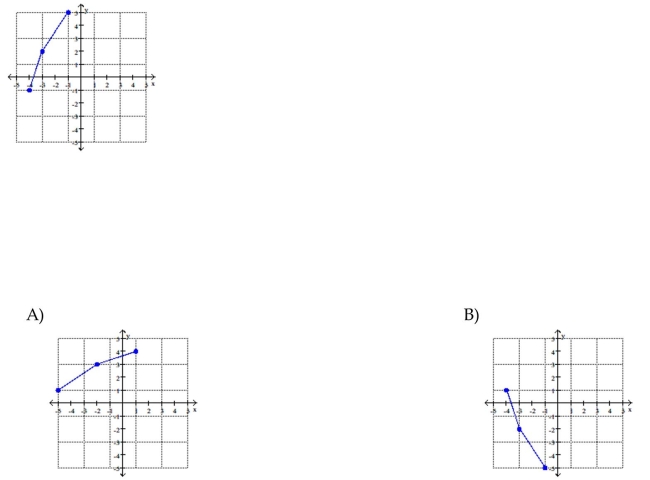




Unlock Deck
Unlock for access to all 314 flashcards in this deck.
Unlock Deck
k this deck
25
Given f (x), write an equation for  ) and then graph f (x) and
) and then graph f (x) and  ) on the same coordinate system.
) on the same coordinate system.
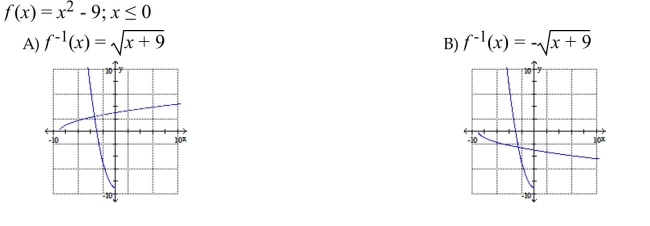

 ) and then graph f (x) and
) and then graph f (x) and  ) on the same coordinate system.
) on the same coordinate system.


Unlock Deck
Unlock for access to all 314 flashcards in this deck.
Unlock Deck
k this deck
26
A one-to-one function is given. Write an expression for the inverse function.



Unlock Deck
Unlock for access to all 314 flashcards in this deck.
Unlock Deck
k this deck
27
Determine whether the two functions are inverses.

A) Yes
B) No

A) Yes
B) No

Unlock Deck
Unlock for access to all 314 flashcards in this deck.
Unlock Deck
k this deck
28
A one-to-one function is given. Write an expression for the inverse function.



Unlock Deck
Unlock for access to all 314 flashcards in this deck.
Unlock Deck
k this deck
29
Solve the problem.
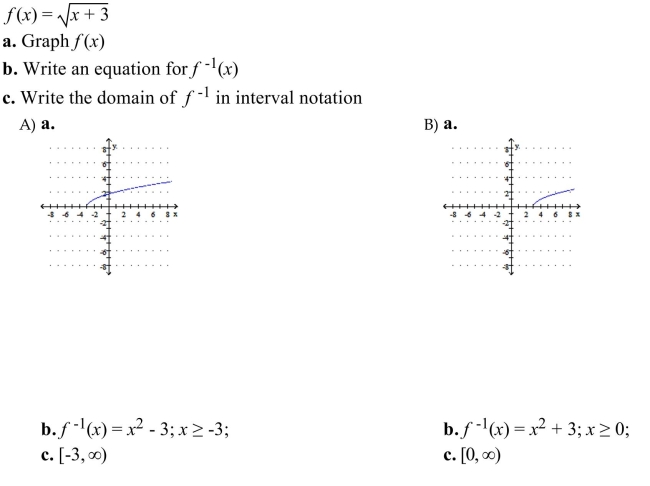






Unlock Deck
Unlock for access to all 314 flashcards in this deck.
Unlock Deck
k this deck
30
Use the definition of a one-to-one function to determine if the function is one-to-one.

A) No
B) Yes

A) No
B) Yes

Unlock Deck
Unlock for access to all 314 flashcards in this deck.
Unlock Deck
k this deck
31
The graph of a function is given. Graph the inverse function.
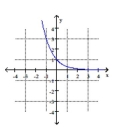






Unlock Deck
Unlock for access to all 314 flashcards in this deck.
Unlock Deck
k this deck
32
Find the inverse mentally.



Unlock Deck
Unlock for access to all 314 flashcards in this deck.
Unlock Deck
k this deck
33
A one-to-one function is given. Write an expression for the inverse function.



Unlock Deck
Unlock for access to all 314 flashcards in this deck.
Unlock Deck
k this deck
34
A one-to-one function is given. Write an expression for the inverse function.



Unlock Deck
Unlock for access to all 314 flashcards in this deck.
Unlock Deck
k this deck
35
Determine whether the two functions are inverses.

A) No
B) Yes

A) No
B) Yes

Unlock Deck
Unlock for access to all 314 flashcards in this deck.
Unlock Deck
k this deck
36
The graph of a function is given. Graph the inverse function.
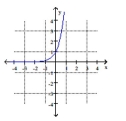






Unlock Deck
Unlock for access to all 314 flashcards in this deck.
Unlock Deck
k this deck
37
A one-to-one function is given. Write an expression for the inverse function.



Unlock Deck
Unlock for access to all 314 flashcards in this deck.
Unlock Deck
k this deck
38
Solve the problem.



Unlock Deck
Unlock for access to all 314 flashcards in this deck.
Unlock Deck
k this deck
39
Find the inverse mentally.



Unlock Deck
Unlock for access to all 314 flashcards in this deck.
Unlock Deck
k this deck
40
Solve the problem.
The millage rate is the amount of property tax per $1000 of the taxable value of a home. For a certain county the millage rate is 29 mil. A city within the county also imposes a flat fee of $101 per
Home.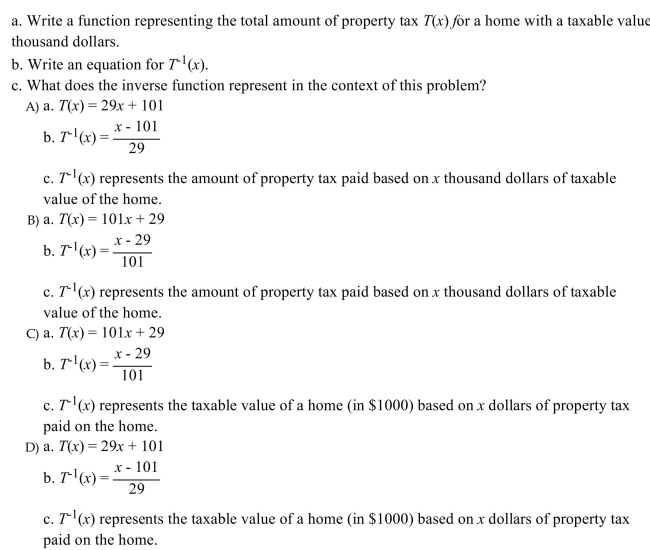 x
x
The millage rate is the amount of property tax per $1000 of the taxable value of a home. For a certain county the millage rate is 29 mil. A city within the county also imposes a flat fee of $101 per
Home.
 x
x
Unlock Deck
Unlock for access to all 314 flashcards in this deck.
Unlock Deck
k this deck
41
Choose the one alternative that best completes the statement or answers the question.
Evaluate the function at the given value of x. Round to 4 decimal places if necessary.

Evaluate the function at the given value of x. Round to 4 decimal places if necessary.


Unlock Deck
Unlock for access to all 314 flashcards in this deck.
Unlock Deck
k this deck
42
Choose the one alternative that best completes the statement or answers the question.
Evaluate the function at the given value of x. Round to 4 decimal places if necessary.

Evaluate the function at the given value of x. Round to 4 decimal places if necessary.


Unlock Deck
Unlock for access to all 314 flashcards in this deck.
Unlock Deck
k this deck
43
Choose the one alternative that best completes the statement or answers the question.
Evaluate the function at the given value of x. Round to 4 decimal places if necessary.

Evaluate the function at the given value of x. Round to 4 decimal places if necessary.


Unlock Deck
Unlock for access to all 314 flashcards in this deck.
Unlock Deck
k this deck
44
Write the word or phrase that best completes each statement or answers the question.
Provide the missing information.

Provide the missing information.


Unlock Deck
Unlock for access to all 314 flashcards in this deck.
Unlock Deck
k this deck
45
Write the word or phrase that best completes each statement or answers the question.
Provide the missing information.
All exponential functions pass through the point .
pass through the point .
Provide the missing information.
All exponential functions
 pass through the point .
pass through the point .
Unlock Deck
Unlock for access to all 314 flashcards in this deck.
Unlock Deck
k this deck
46
Write the word or phrase that best completes each statement or answers the question.
Provide the missing information.
The graph of is (increasing/decreasing) over its domain.
is (increasing/decreasing) over its domain.
Provide the missing information.
The graph of
 is (increasing/decreasing) over its domain.
is (increasing/decreasing) over its domain.
Unlock Deck
Unlock for access to all 314 flashcards in this deck.
Unlock Deck
k this deck
47
Write the word or phrase that best completes each statement or answers the question.
Provide the missing information.
The domain of an exponential function is .
is .
Provide the missing information.
The domain of an exponential function
 is .
is .
Unlock Deck
Unlock for access to all 314 flashcards in this deck.
Unlock Deck
k this deck
48
Graph the function and write the domain and range in interval notation.
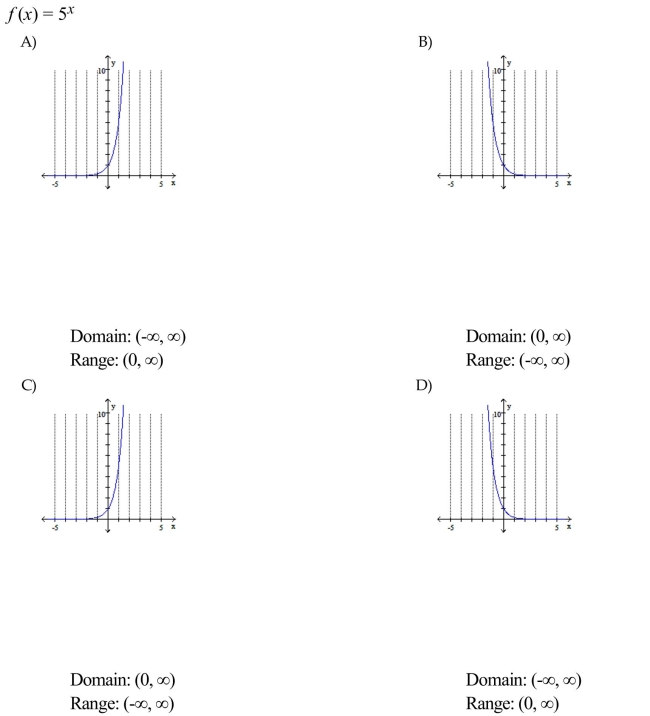


Unlock Deck
Unlock for access to all 314 flashcards in this deck.
Unlock Deck
k this deck
49
Write the word or phrase that best completes each statement or answers the question.
Provide the missing information.
The range of an exponential function is .
is .
Provide the missing information.
The range of an exponential function
 is .
is .
Unlock Deck
Unlock for access to all 314 flashcards in this deck.
Unlock Deck
k this deck
50
Choose the one alternative that best completes the statement or answers the question.
Evaluate the function at the given value of x. Round to 4 decimal places if necessary.

Evaluate the function at the given value of x. Round to 4 decimal places if necessary.


Unlock Deck
Unlock for access to all 314 flashcards in this deck.
Unlock Deck
k this deck
51
Solve the problem.
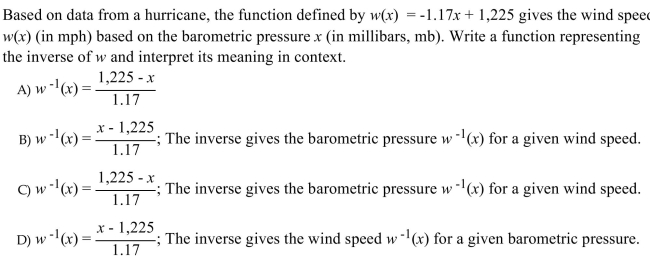


Unlock Deck
Unlock for access to all 314 flashcards in this deck.
Unlock Deck
k this deck
52
Write the word or phrase that best completes each statement or answers the question.
Provide the missing information.
The horizontal asymptote of an exponential function is the line .
is the line .
Provide the missing information.
The horizontal asymptote of an exponential function
 is the line .
is the line .
Unlock Deck
Unlock for access to all 314 flashcards in this deck.
Unlock Deck
k this deck
53
Write the word or phrase that best completes each statement or answers the question.
Provide the missing information.
The graph of is (increasing/decreasing) over its domain.
is (increasing/decreasing) over its domain.
Provide the missing information.
The graph of
 is (increasing/decreasing) over its domain.
is (increasing/decreasing) over its domain.
Unlock Deck
Unlock for access to all 314 flashcards in this deck.
Unlock Deck
k this deck
54
Write the word or phrase that best completes each statement or answers the question.
Provide the missing information.

Provide the missing information.


Unlock Deck
Unlock for access to all 314 flashcards in this deck.
Unlock Deck
k this deck
55
Choose the one alternative that best completes the statement or answers the question.
Evaluate the function at the given value of x. Round to 4 decimal places if necessary.

A) 6
B) 4.899
C) 5.4622
D) Undefined
Evaluate the function at the given value of x. Round to 4 decimal places if necessary.

A) 6
B) 4.899
C) 5.4622
D) Undefined

Unlock Deck
Unlock for access to all 314 flashcards in this deck.
Unlock Deck
k this deck
56
Write the word or phrase that best completes each statement or answers the question.
Provide the missing information.
The function is the exponential function base and is also called the
is the exponential function base and is also called the
exponential function.
Provide the missing information.
The function
 is the exponential function base and is also called the
is the exponential function base and is also called theexponential function.

Unlock Deck
Unlock for access to all 314 flashcards in this deck.
Unlock Deck
k this deck
57
Write the word or phrase that best completes each statement or answers the question.
Provide the missing information.
The formula gives the amount A in an account after t years at an interest rate r under the
gives the amount A in an account after t years at an interest rate r under the
assumption that interest is compounded .
Provide the missing information.
The formula
 gives the amount A in an account after t years at an interest rate r under the
gives the amount A in an account after t years at an interest rate r under theassumption that interest is compounded .

Unlock Deck
Unlock for access to all 314 flashcards in this deck.
Unlock Deck
k this deck
58
Write the word or phrase that best completes each statement or answers the question.
Provide the missing information.

Provide the missing information.


Unlock Deck
Unlock for access to all 314 flashcards in this deck.
Unlock Deck
k this deck
59
Write the word or phrase that best completes each statement or answers the question.
Provide the missing information.
The function defined by (is/is not) an exponential function.
(is/is not) an exponential function.
Provide the missing information.
The function defined by
 (is/is not) an exponential function.
(is/is not) an exponential function.
Unlock Deck
Unlock for access to all 314 flashcards in this deck.
Unlock Deck
k this deck
60
Graph the function and write the domain and range in interval notation.
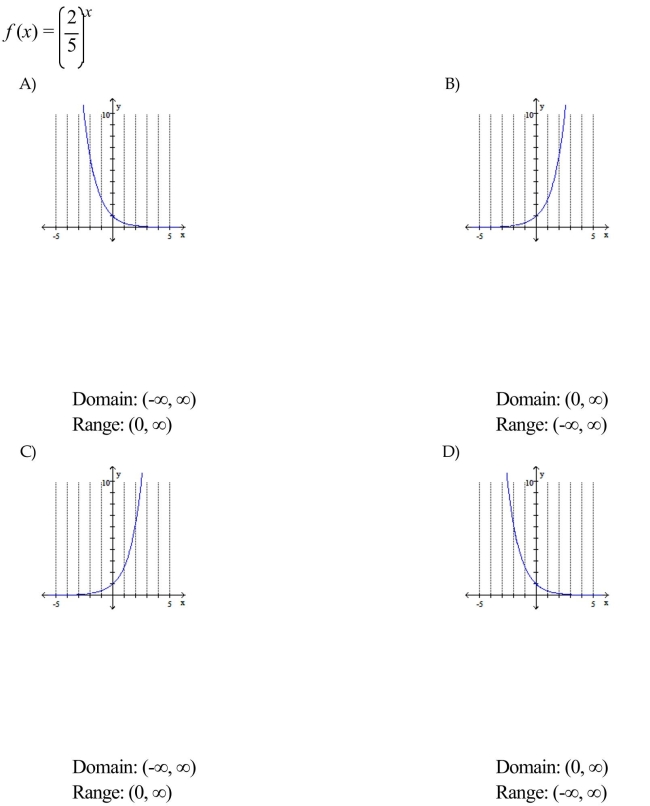


Unlock Deck
Unlock for access to all 314 flashcards in this deck.
Unlock Deck
k this deck
61
Solve the problem.
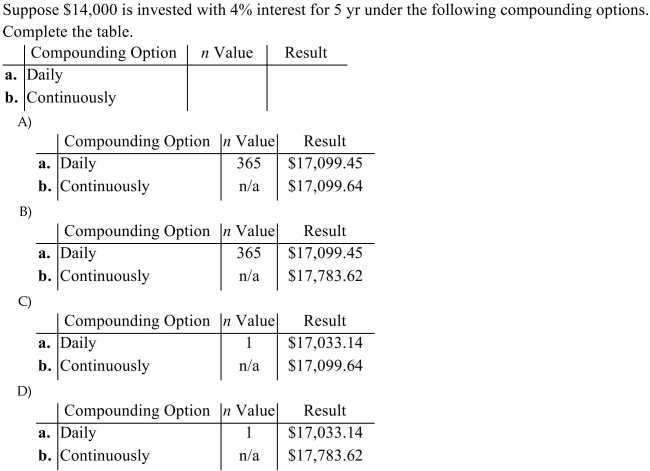


Unlock Deck
Unlock for access to all 314 flashcards in this deck.
Unlock Deck
k this deck
62
Graph the function and write the domain and range in interval notation.
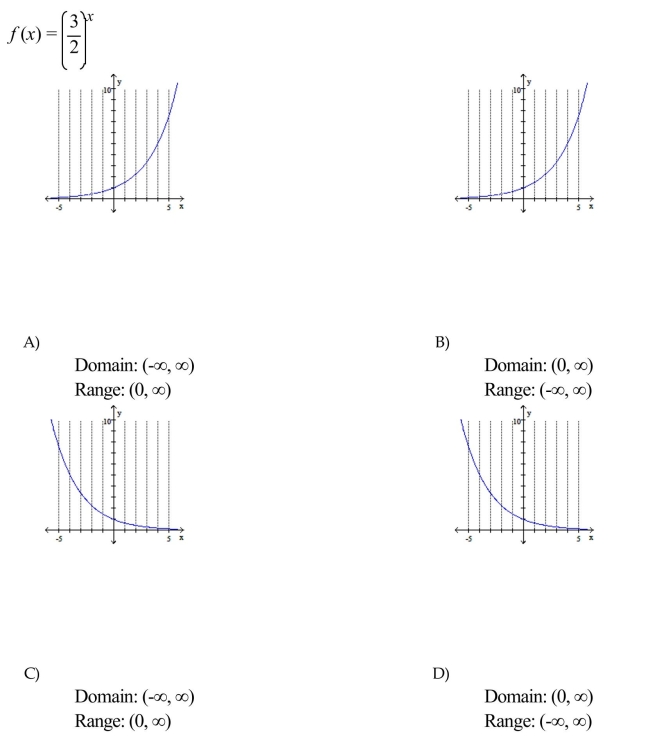


Unlock Deck
Unlock for access to all 314 flashcards in this deck.
Unlock Deck
k this deck
63
Solve the problem.

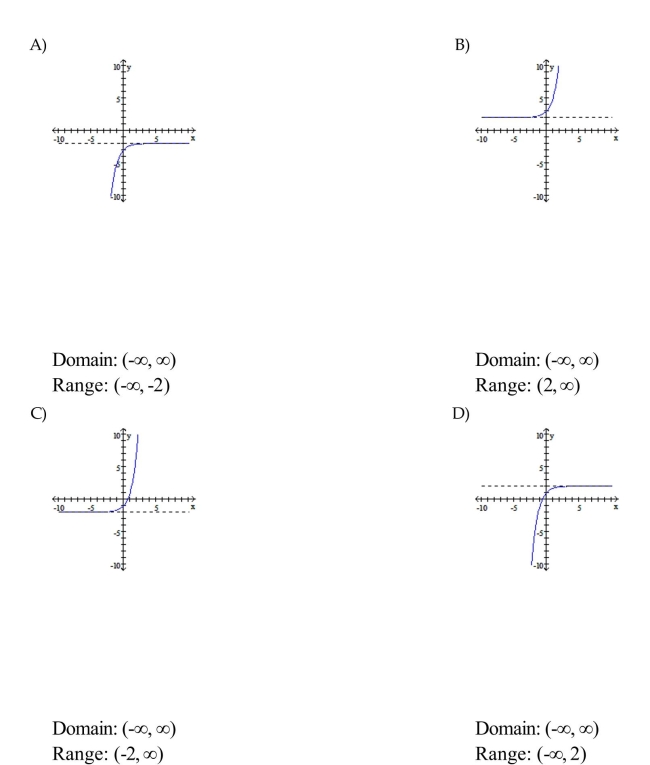



Unlock Deck
Unlock for access to all 314 flashcards in this deck.
Unlock Deck
k this deck
64
Graph the function and write the domain and range in interval notation.
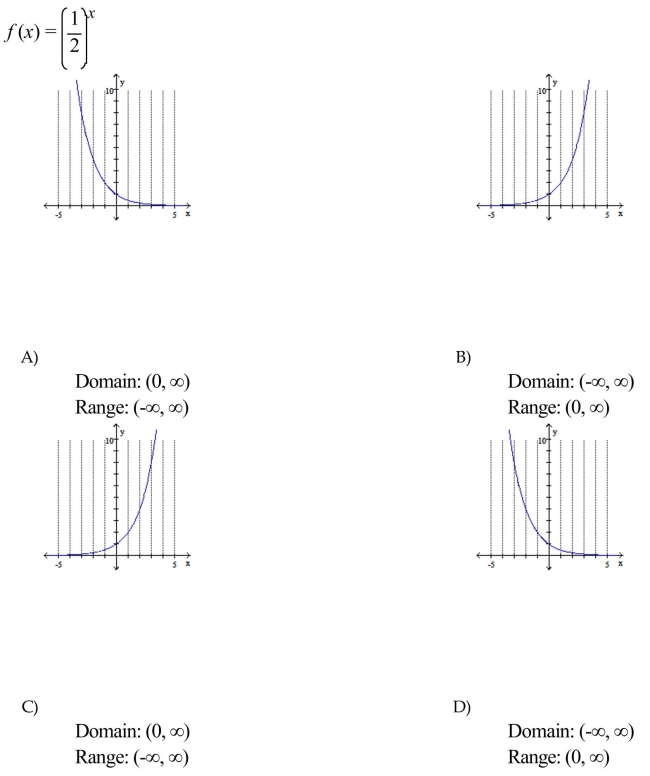


Unlock Deck
Unlock for access to all 314 flashcards in this deck.
Unlock Deck
k this deck
65
Solve the problem.
The atmospheric pressure on an object decreases as altitude increases. If a is the height (in km) above sea level, then the pressure P(a) (in mmHg) is approximated by P(a) = 760e-0.13a. Determine
The atmospheric pressure at 7.176 km. Round to the nearest whole unit.
A) 4,789 mmHg
B) 261 mmHg
C) 299 mmHg
D) 379 mmHg
The atmospheric pressure on an object decreases as altitude increases. If a is the height (in km) above sea level, then the pressure P(a) (in mmHg) is approximated by P(a) = 760e-0.13a. Determine
The atmospheric pressure at 7.176 km. Round to the nearest whole unit.
A) 4,789 mmHg
B) 261 mmHg
C) 299 mmHg
D) 379 mmHg

Unlock Deck
Unlock for access to all 314 flashcards in this deck.
Unlock Deck
k this deck
66
Solve the problem.
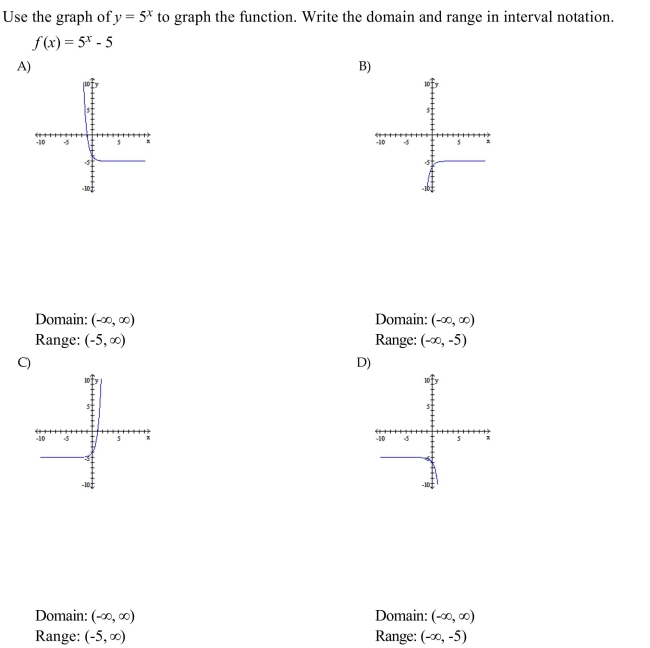


Unlock Deck
Unlock for access to all 314 flashcards in this deck.
Unlock Deck
k this deck
67
Use transformations of the graph  to graph the function. Write the domain and range in interval
to graph the function. Write the domain and range in interval
notation.
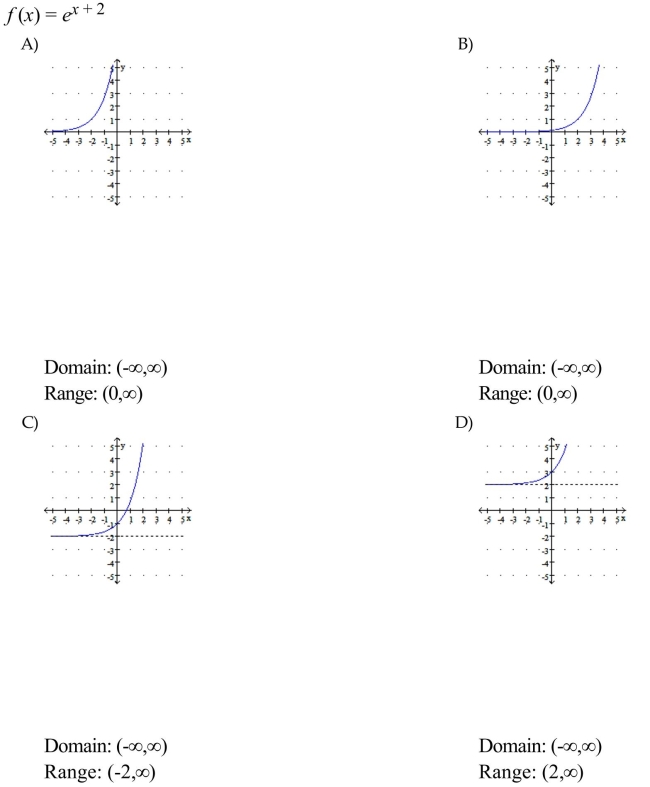
 to graph the function. Write the domain and range in interval
to graph the function. Write the domain and range in intervalnotation.


Unlock Deck
Unlock for access to all 314 flashcards in this deck.
Unlock Deck
k this deck
68
Use transformations of the graph  to graph the function. Write the domain and range in interval
to graph the function. Write the domain and range in interval
notation.
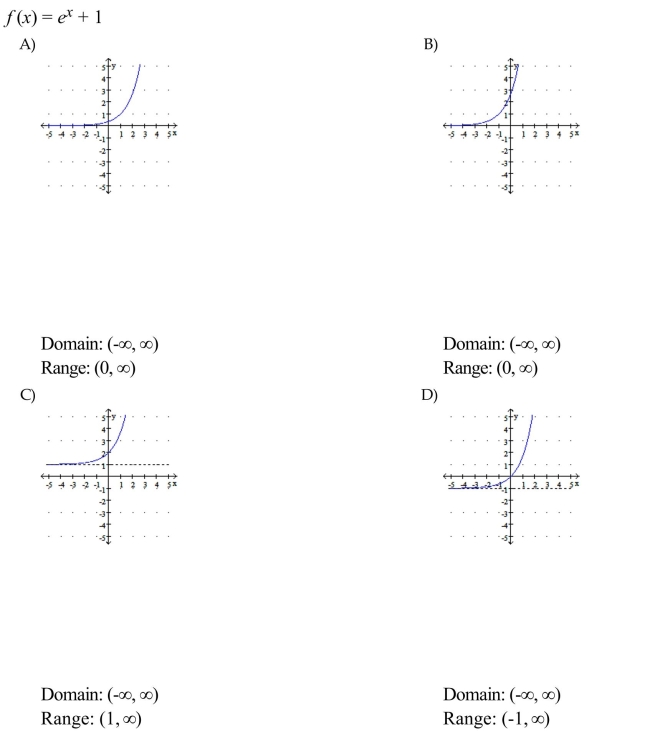
 to graph the function. Write the domain and range in interval
to graph the function. Write the domain and range in intervalnotation.


Unlock Deck
Unlock for access to all 314 flashcards in this deck.
Unlock Deck
k this deck
69
Solve the problem.
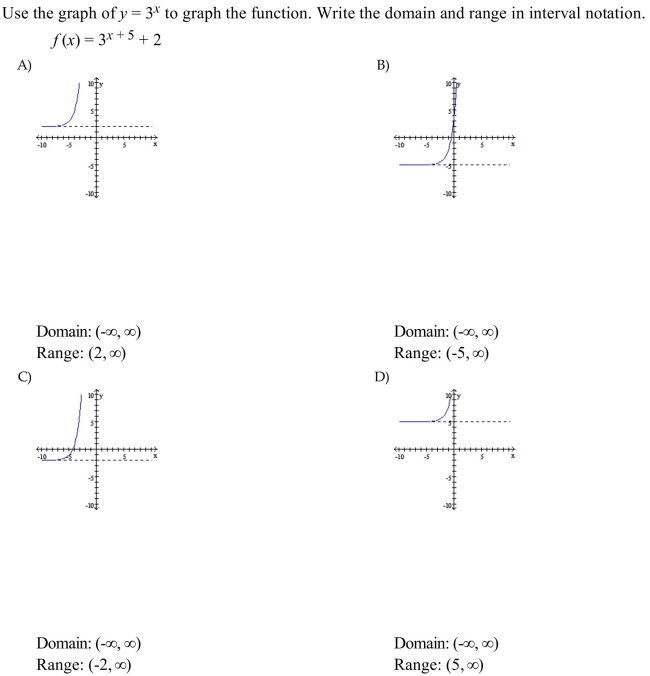


Unlock Deck
Unlock for access to all 314 flashcards in this deck.
Unlock Deck
k this deck
70
Solve the problem.

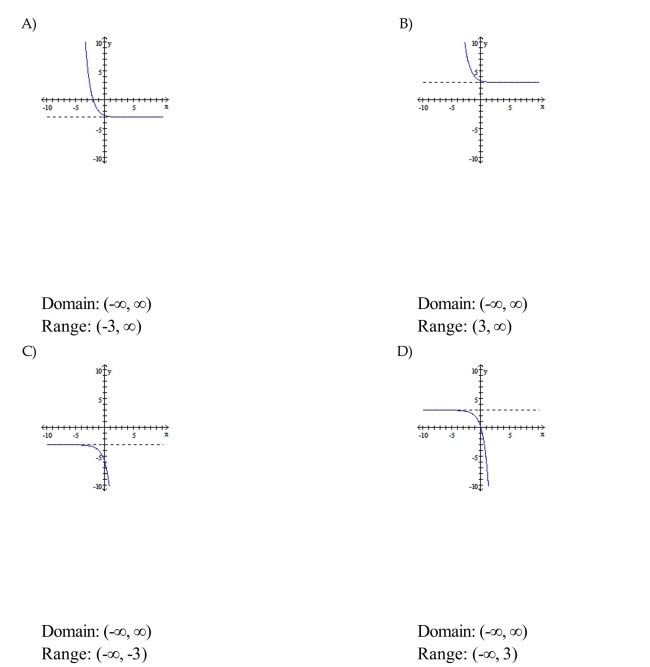



Unlock Deck
Unlock for access to all 314 flashcards in this deck.
Unlock Deck
k this deck
71
ng, in
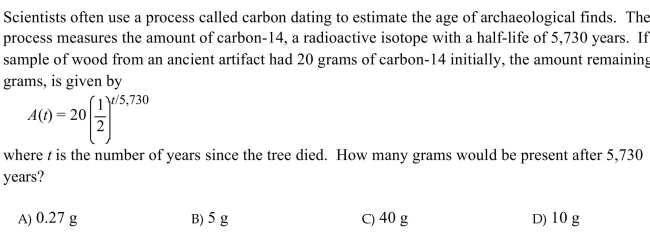


Unlock Deck
Unlock for access to all 314 flashcards in this deck.
Unlock Deck
k this deck
72
Evaluate the function at the given value of x. Round to 4 decimal places if necessary.

A) -5.4366
B) 6.5809
C) 0.6931
D) 0.1353

A) -5.4366
B) 6.5809
C) 0.6931
D) 0.1353

Unlock Deck
Unlock for access to all 314 flashcards in this deck.
Unlock Deck
k this deck
73
ng, in



Unlock Deck
Unlock for access to all 314 flashcards in this deck.
Unlock Deck
k this deck
74
Solve the problem.
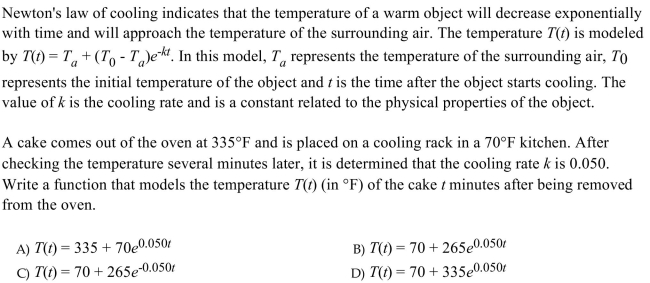


Unlock Deck
Unlock for access to all 314 flashcards in this deck.
Unlock Deck
k this deck
75
Solve the problem.
James wants to invest $8,000. He can invest the money at 7.2% simple interest for 30 yr or he can invest at 7% with interest compounded continuously for 30 yr. Which option results in more total
Interest?
A) 7% compounded continuously results in more total interest
B) 7.2% simple interest results in more total interest
James wants to invest $8,000. He can invest the money at 7.2% simple interest for 30 yr or he can invest at 7% with interest compounded continuously for 30 yr. Which option results in more total
Interest?
A) 7% compounded continuously results in more total interest
B) 7.2% simple interest results in more total interest

Unlock Deck
Unlock for access to all 314 flashcards in this deck.
Unlock Deck
k this deck
76
Solve the problem.
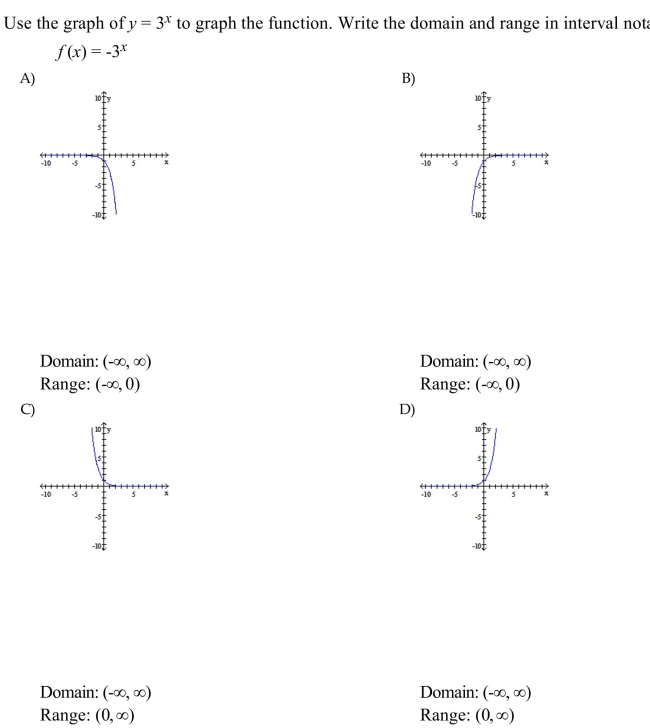 ation.
ation.
 ation.
ation.
Unlock Deck
Unlock for access to all 314 flashcards in this deck.
Unlock Deck
k this deck
77
Solve the problem.
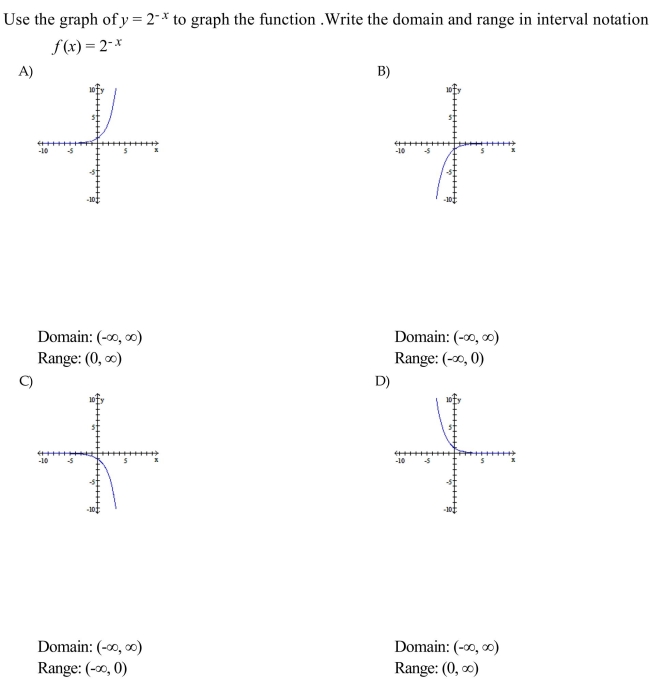


Unlock Deck
Unlock for access to all 314 flashcards in this deck.
Unlock Deck
k this deck
78
Use transformations of the graph  to graph the function. Write the domain and range in interval
to graph the function. Write the domain and range in interval
notation.
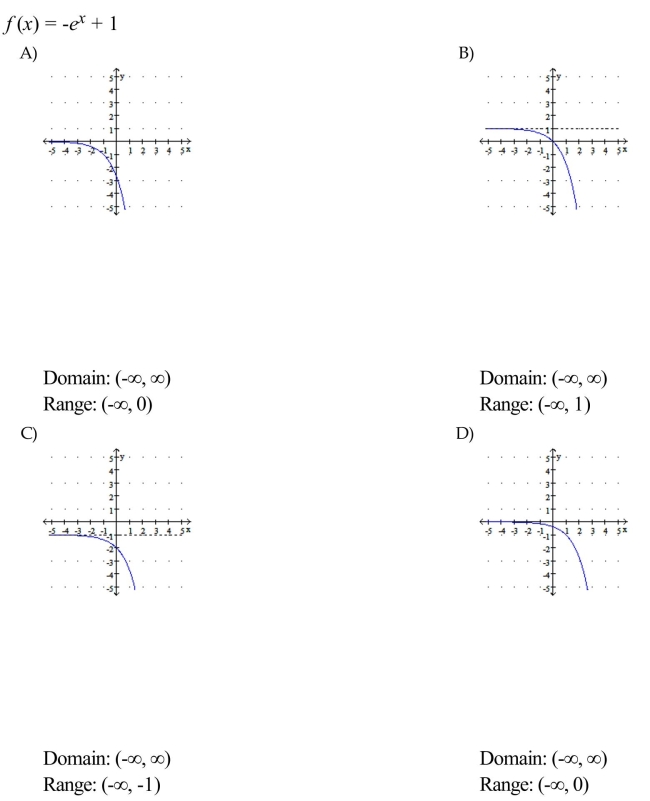
 to graph the function. Write the domain and range in interval
to graph the function. Write the domain and range in intervalnotation.


Unlock Deck
Unlock for access to all 314 flashcards in this deck.
Unlock Deck
k this deck
79
Solve the problem.
Bethany needs to borrow $8,000. She can borrow money at 6.9% simple interest for 3 yr or she can borrow at 6.5% with interest compounded continuously for 3 yr. Which option results in less total
Interest?
A) 6.5% compounded continuously results in less total interest
B) 6.9% simple interest results in less total interest
Bethany needs to borrow $8,000. She can borrow money at 6.9% simple interest for 3 yr or she can borrow at 6.5% with interest compounded continuously for 3 yr. Which option results in less total
Interest?
A) 6.5% compounded continuously results in less total interest
B) 6.9% simple interest results in less total interest

Unlock Deck
Unlock for access to all 314 flashcards in this deck.
Unlock Deck
k this deck
80
Solve the problem.
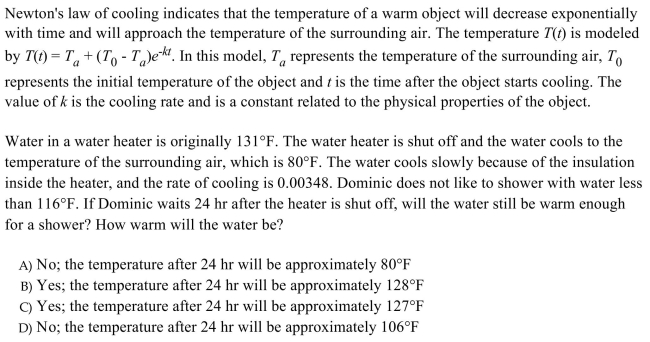


Unlock Deck
Unlock for access to all 314 flashcards in this deck.
Unlock Deck
k this deck


